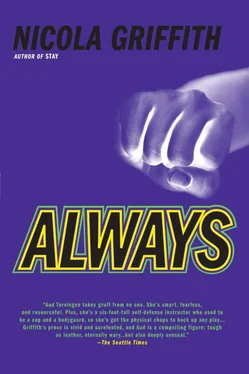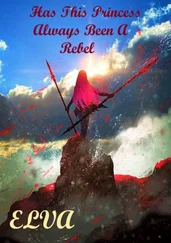“Is everyone all right? Dornan?”
“He’s fine, everyone’s fine.” Her hand was in mine again.
“How come you’re not wearing a blanket?”
“I don’t have one eyebrow burnt off and a displaced rib.”
“It doesn’t hurt.”
“It will.” She was smiling, an otter playing in a smoky waterfall. My face ached. It seemed I was smiling, too.
Then there was a confusion of lights as another fire truck pulled into the lot and burly figures in coats jumped down. More lights, different. Cameras.
I pushed the blanket off. It was hot. Smoke reached a hundred yards into the bright blue sky. That wasn’t going to look good on EPA paperwork.
Kick was there again. “Can you walk?”
“Yes.”
“We have to move back, the whole place is going up. If you don’t walk, they’ll stuff you in an ambulance.”
“Right.”
I stood up. I felt remarkably steady. The ground was perfectly still and solid under my feet.
Six cameras were rolling. Three were network teams, three were ours. Rusen coughed, shouted something at me, flames leaping in miniature in his glasses, coughed again.
“Better than a bit of propane,” Kick said. “You’re insured, right?”
I laughed. She was right, it did hurt.
LESSON 16
THE AIR-CONDITIONING UNIT APPEARED TO BE BROKEN. THE AIR IN THE BASEMENT felt too big and humid for such a small space but I doubted we’d be doing much physical work today.
Sandra’s hand was in a cast, her forehead hidden behind gauze. I was surprised she was there at all. She sat by herself at the end of the bench.
Violence very often acts as a social flocculant. When added to a community—individuals suspended in a liquid of custom and mores—it separates out the individuals. The common mix, the community, is threatened. The class had watched the splashy, television light, the microphone thrust in Sandra’s face, the way she had stared impassively at the body bag on the gurney as it was wheeled into the ambulance without the lights, and the class had separated her out to protect their world, the one where violence happened to other people.
Therese stood with the others. She smiled and touched people on the arm as she talked, working hard to be one of them. Her connection with Sandra would not survive.
I studied them. They studied me back while pretending they were not, except Sandra, who stared openly. She had killed a man: why should she worry about minor infractions of the social code? I stared back.
I would never know exactly the extent of her premeditation. It didn’t matter. It had been my decision to help her frame a guilty man. We are the sum of our decisions.
She looked away, and in profile, without blood covering the lines, I saw the difference: the plumpness, the softness, the change of skin texture around the eyes.
I turned my gaze to the others. Perhaps the sum of my decisions stared out at them. They dropped their eyes immediately. I nodded. To them I was like Sandra. They didn’t want to meet my gaze in case something leapt from my eye to theirs and invaded their brain.
“Not looking at something never, in the history of the world, made it go away,” I said. “So look at this.”
Southern women can’t stand silence. Eventually, Jennifer said, “How do you mean?”
“I mean face it. Engage. Ask questions. Think. Talk. Don’t wish it away.”
Uncomfortable silence again. “I still don’t understand,” Jennifer said.
“How do you all feel? You, Nina. You, Katherine. What do you think? Tonya, Suze, Pauletta. Anyone?”
It was like one of the early classes. I don’t think you know what you’re getting yourself into. If I had known, would I have done it?
“All right. Do you feel proud?”
“Proud?” Jennifer said.
“Proud: feeling pleasurable satisfaction over an act, possession, quality, or relationship by which one measures one’s stature or self-worth. Feeling or showing justifiable self-respect.”
“Why?” Nina said. “It wasn’t us that did anything.”
“Sandra couldn’t have done what she did without this class. You worked together for nearly three months. You hyperventilated in fear together, you threw and let yourselves be thrown, you trusted each other enough to let yourselves be choked. You all learned together.”
They cut glances at Sandra. I knew they were wondering: then was this our fault?
“The thing is, we can’t judge another’s actions. We can never, any of us, know the struggles someone else goes through. We might think we know, but we don’t.”
“I’m here,” Sandra said. “Why not just ask?”
“Okay,” Suze said.
Silence.
“I’m pregnant,” Sandra said. “He’d hurt me before. I knew he’d do it again. My kids had seen me beaten over and over. When I found out I was having a baby, I thought, I just can’t let him do that anymore. I couldn’t, could I?”
“No,” said Christie.
“I had to protect my baby.”
“That’s right,” said Kim.
Their shoulders dropped a fraction, they turned slightly to face Sandra. The muscles around their eyes relaxed. I could have closed my eyes and known, just by the sound of their breath and the subtle change in their scent, that the group was re-forming, that Sandra was being conditionally reabsorbed. Protect the children, the old clarion call. I wasn’t sure whom I disliked the most: Sandra for manipulating them, them for allowing it, or me for sitting witness.
“How far along are you?” Nina said. “Only I was wondering if that’s why you signed up.”
Sandra looked wary, but Nina plowed on, unaware of what she’d asked.
“I signed up because of what happened to my sister’s youngest. Made me think. I went into a coffee shop in Smyrna, Borealis—anyone know it?”
“No way!” Pauletta said. “I saw the flyer in Borealis, too, only in Decatur.”
“So why’d you sign up?” Nina said.
“Because some yahoo neighbor who’d been drinking thumped on my windshield one night and I thought he wanted to jack the car. Turned out he was just staggering around. Scared the crap out of me, though.”
“I saw a flyer at college,” Christie said.
“Which one?”
“Agnes Scott.”
I wondered how it got there.
“Coffee shop,” Tonya said.
“Me, too.”
“And me.”
“E-mail,” Suze said, “a friend. That’s why I was late that first day. She was supposed to come along. She chickened out.”
“I nearly chickened out,” Katherine said. “That first day.” I remembered the footsteps in the dust on the stairwell: down and then up and then down again. “I was so nervous.”
“Yeah. I thought I’d get mashed in the face first thing,” Tonya said.
“No, that was later,” Katherine said, and everyone smiled.
“I think we were all afraid,” Therese said to me. “But you taught us a lot.”
All past tense.
Then they were all standing together, even Sandra—Suze helped her to her feet—facing me, smiling.
“Thank you,” Therese said. She was holding something towards me.
They were happy, relieved, ready to reminisce: they were no longer scared because they were done. They’d finished their sixteen-week course and beaten up a padded man and frightened a bookstore clerk and looked a killer in the face, and now they were safe.
“It’s a small token of our appreciation.”
An envelope. I took it.
“It’s a gift card.”
A picture of azaleas. Bright and impersonal as a southern smile.
“We didn’t know what you’d want, but then we thought, Well, everyone likes coffee.”
“Or tea,” Nina said.
“Right.” They sounded anxious.
Читать дальше












